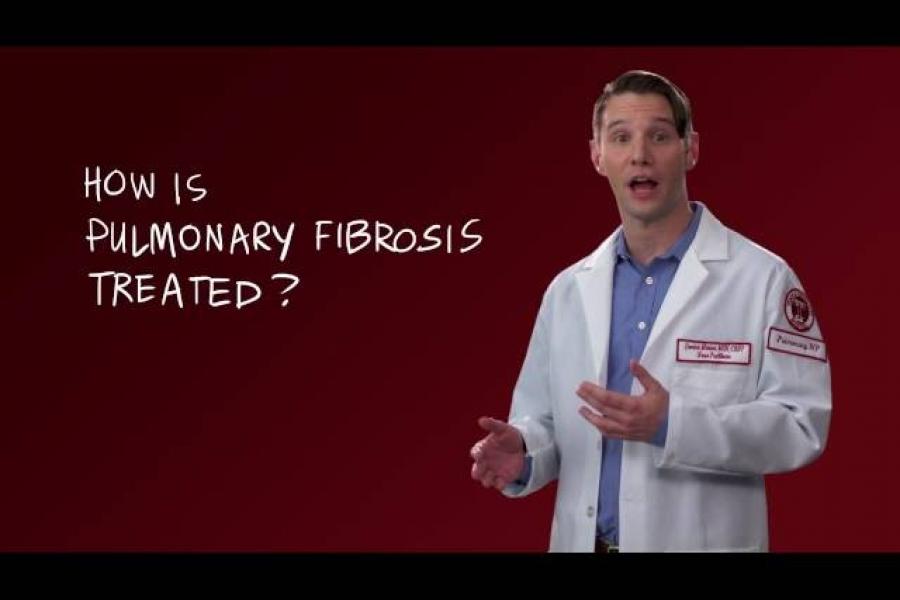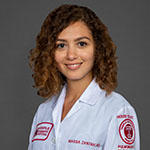Treatment of pulmonary fibrosis focuses on alleviating symptoms and improving quality of life. Unfortunately, the scarring of the lungs that occurs with pulmonary fibrosis (PF) cannot be reversed. But with early and accurate diagnosis, targeted treatments supplemented with oxygen therapy and pulmonary rehabilitation may help improve breathing and slow the progress of the disease.
Temple’s Interstitial Lung Disease Program experts are national leaders in caring for patients with this challenging lung disease. With years of experience in diagnosing and treating the most complex lung conditions, we offer fast, innovative testing and the full spectrum of advanced treatment options for patients with all types of pulmonary fibrosis.
Together, our specialists work closely with your doctor to find out the cause and severity of your pulmonary fibrosis. Using this information, Temple’s pulmonary fibrosis team will develop a treatment plan tailored to your needs. This may include a combination of lifestyle changes, medications, supplemental oxygen, and pulmonary rehab. If your pulmonary fibrosis is very advanced, your team may recommend a lung transplant through Temple’s Lung Transplant Program, one of the most active programs in the country.
Temple researchers continue to explore new ways to help patients with pulmonary fibrosis. Our involvement in the latest clinical trials enables Temple Health to offer the most current therapies available.
Medications
Depending on the cause and severity of your PF, you may be prescribed medication therapy to help relieve symptoms and slow the progression of your PF. The latest pulmonary fibrosis medications include:
Anti-fibrotic agents
Nintedanib (Ofev®) and pirfenidone (Esbriet®) are FDA-approved for patients with PF. These medications work to slow down the scarring (fibrosis) of the lungs caused by pulmonary fibrosis. These medicines may cause side effects and require monitoring with blood work while taking.
Anti-inflammatories
Chronic inflammation may lead to scarring in the tiny air sacs of the lungs. Your pulmonologist may prescribe anti-inflammatories such as steroids to help decrease inflammation. When used long-term, steroids can have side effects. Close monitoring is required when taking these medications.
Other immune suppressants
Like steroids and anti-fibrotic agents, other medications may work to reduce inflammation by suppressing the immune system. These include cyclophosphamide (Cytoxan), mycophenolate mofetil (CellCept®) and azathioprine (Imuran®).
Symptom management
Dry cough is a common symptom of pulmonary fibrosis. If your PF is linked to gastroesophageal reflux disease (GERD), you may be prescribed medications to reduce the amount of acid in your stomach. Your doctor may also prescribe anti-tussive medications to help relieve cough.
Lifestyle
Stopping smoking immediately is very important for all patients with idiopathic pulmonary fibrosis. If you smoke, your doctor can help recommend treatments that will help you quit. Patients should also avoid sources of any lung irritant, including allergens, toxins, fumes, dust, and second hand smoke.
Pulmonary rehabilitation is a standard treatment for people with chronic lung disease. It's a broad program that helps improve the quality of life and well-being of people with these conditions. Pulmonary rehab may include:
- Exercise training
- Nutritional counseling
- Psychological counseling or support groups
- Breathing strategies or exercises
- Education about the condition and the best way to manage it
- Techniques for conserving energy
Pulmonary rehab does not replace medical therapy. It's used alongside medical treatments to help patients better manage their conditions and function at their best.
You are the most essential member of your care team. While your medical team will focus on the treatments that are right for you, your focus should be on maintaining the best health possible. This ensures you get the most benefit from your treatment plan. You can start by maintaining good nutrition habits and a healthy weight for your frame. Be sure to gather your support team around you to help you stay focused on your own health program and to give you ideas about how to get the most out of every day.
Temple offers a comprehensive pulmonary rehabilitation program to support you in your efforts. Pulmonary rehabilitation is a standard treatment used alongside medication therapy for those with chronic lung disease. Temple’s pulmonary rehab specialists help you understand the impact healthy behaviors have on your daily life. You may work with your rehab team to learn how to:
- Eat nourishing foods
- Stay hydrated
- Exercise daily, and conserve your energy
- Manage your stress, including support groups
- Take your PF medications as directed
- Use your supplemental oxygen
Smoking Cessation
Stopping smoking immediately is very important for all patients with IPF. If you smoke, your doctor can help recommend treatments which will help you quit. Patients should also avoid sources of any lung irritant, including allergens, toxins, fumes, dust, and second-hand smoke.
Find out how Temple’s Smoking Cessation Program can help you quit smoking >
Clinical Trials
Pulmonary fibrosis clinical trials are research studies designed to explore the effectiveness and safety of potential new treatments. Every day, researchers with Temple’s Interstitial Lung Disease Program strive to make new discoveries in the areas of pulmonary fibrosis treatment, including devices, behavioral therapies, testing and diagnostic methods, and medications. Find out if you’re eligible for a clinical trial.
Ready for an Appointment?
If you're experiencing signs or symptoms of pulmonary fibrosis, schedule an appointment or call 800-TEMPLE-MED (800-836-7536) today.
Learn more about our doctors and care team who diagnose and treat pulmonary fibrosis.



